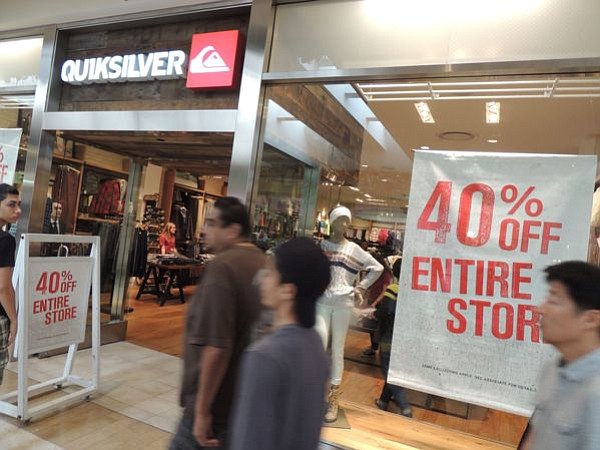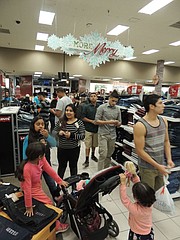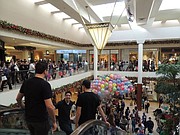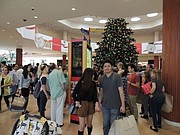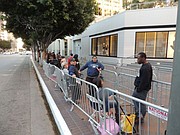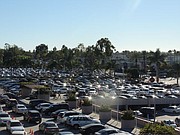THE DOORBUSTER: A Quiksilver boutique at South Coast Plaza offered discounts of 40 percent during Black Friday weekend. But many retailers offered deeper discounts during the weekend.
Black Friday Shopping Down, But NRF Remains Optimistic for ‘Superbowl’ of Shopping
The Black Friday weekend represented a tough beginning to what many economists still forecast to be a holiday season of good sales.
Spending declined 6.4 percent during the holiday weekend, with typical consumers spending $380.95 during the holiday weekend, down from $407.02 spend last year.
Black Friday’s retail traffic declined with 55.1 percent of holiday consumers shopping in physical stores and online over the Thanksgiving weekend, compared with 58.7 percent of holiday consumers shopping during the Black Friday weekend last year.
Total spending is forecast to reach $50.9 billion during the weekend, a decrease from last year’s estimated $57.4 billion, according to the National Retail Federation’s Thanksgiving Weekend Spending Survey, which was conducted by Prosper Insights & Analytics and released on Nov. 30.
Despite the declines, the NRF would not revise its forecast of a 4.1 percent increase of holiday sales where $616.9 billion is predicted to be spent at U.S. retailers, Matthew Shay, president and chief executive officer of the NRF, said during a Nov. 30 conference call.
The weekend’s decline during what is the typically the most bullish time of the year reflects, among other things, consumers changing the way they shop, and some shoppers exhibiting anxiety about the economy. However Shay was upbeat about the holiday season, because it remains the Superbowl of shopping, he said.
“There’s not another day of the year when 85 million Americans are shopping,” he said of Black Friday. “Is it different from a year ago? Yes. But the only thing that this can be compared with this, a lot of executives say, is the Superbowl.”
The macro economy also has been giving presents to retailers. Declining gas prices have the potential to put $70 billion extra dollars into the economy. Inclement weather is not forecast to get in the way of shopping this year, and many retailers found ways to get around the ongoing work slowdown at West Coast ports, and to deliver goods to their consumers, Shay said during the conference call.
But there was no getting around changes in the way people shop. Pre-Black Friday deals and shopping took momentum away from the season’s kickoff weekend. Many consumers postponed shopping on the Thanksgiving weekend because they forecast that they could get better holiday deals at a later date, Shay said.
“The CEOs are saying this season will be really promotional,” Shay said. “It is going to be a dog fight every day.”
In a Nov. 30 research note, Ken Perkins, president of Boston area market research group Retail Metrics, echoed Shay’s assertion that shopping has changed. Black Friday had turned into a Black November. “Retailers initiated deals and promotions earlier this year, not waiting for the traditional Black Friday holiday kick off—30 percent to 50 percent off were common across the mall prior throughout November,” Perkins wrote.
A decline in Black Friday mall traffic should be no surprise, said Jeff Van Sinderen, an analyst with B. Riley & Co., financial services firm. E-commerce business has been skyrocketing for the past few years. “You’ll see that business going up double digits,” he forecast. “You have to see it take away from somewhere, it is going to come from brick-and-mortar,” he said.
Market research company comScore reported that e-commerce retailers had a spectacular Black Friday weekend. Americans spent more than $1 billion both on Thanksgiving and during the day of Black Friday, Nov. 28, Gian Fulgoni, the chairman emeritus of comScore, said in a Nov. 30 statement.
“The strength we saw in the early online buying rush likely reflects a few things, including overall health in consumer spending, responsiveness to the strong deals being offered online, and perhaps some shoppers opting to stay home on Thanksgiving rather than head out to the stores that opened their doors early,” Fulgoni said. “Regardless of the particular drivers, it’s clear that the online holiday rush is getting off to a very good start and is reason for optimism as we get into the heart of the buying season.”
